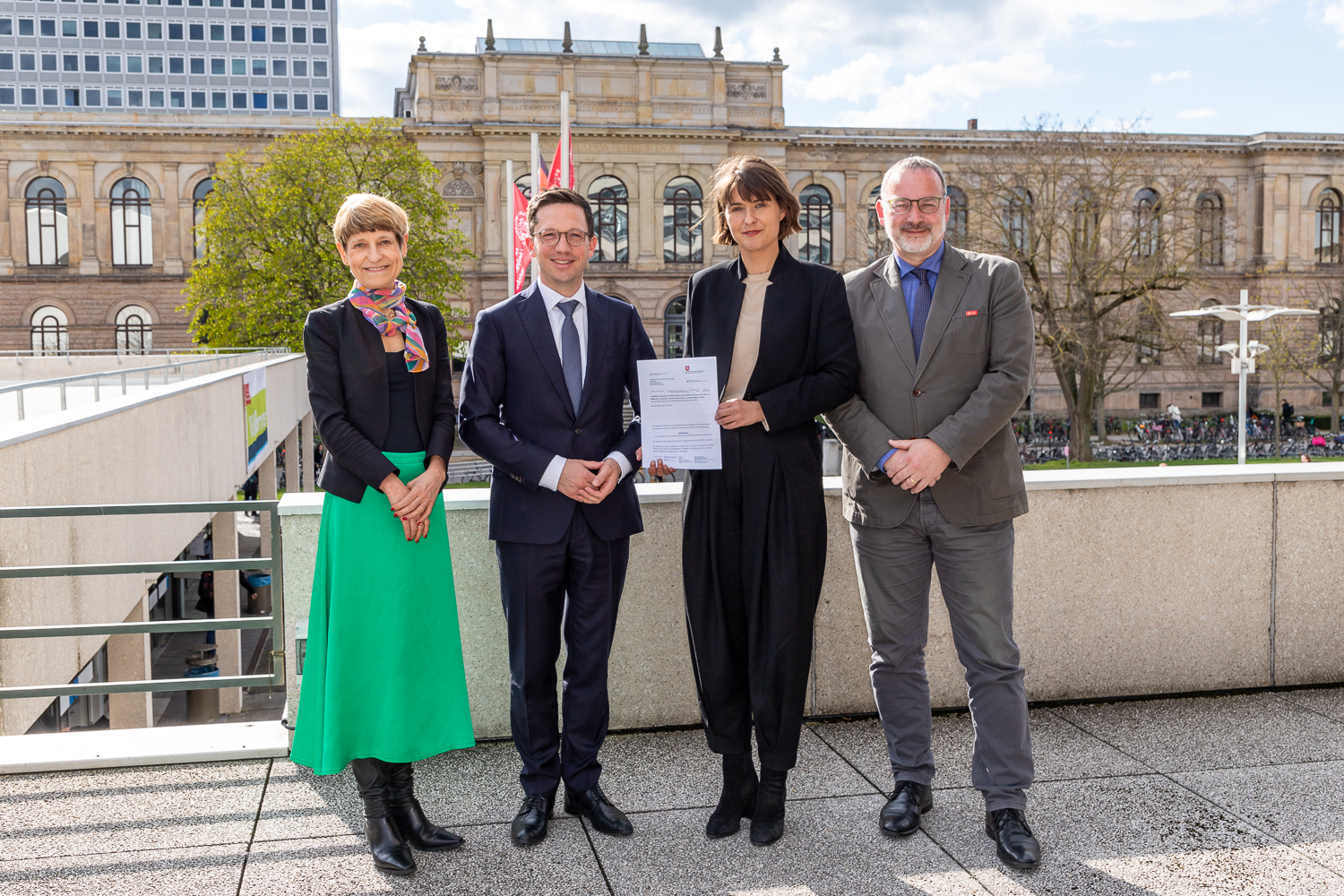A Centre for Climate Research in Lower Saxony Science Minister Falko Mohrs hands over funding notice
Climate change is becoming increasingly noticeable in Lower Saxony as well. Temperatures are rising and drier spring and summer months along with occasional heavy rainfall are becoming more and more frequent. In order to decisively advance research on climate change in the coming years, interdisciplinary teams will soon be working on solutions for a safe and just climate future in issue-specific future-oriented laboratories. The activities will be bundled in the Zentrum Klimaforschung Niedersachsen (ZKfN) (Lower Saxony Centre for Climate Research) at Technische Universität Braunschweig. The state of Lower Saxony is supporting the settlement of the ZKfN at TU Braunschweig with around 1.9 million euros. Lower Saxony’s Minister for Science and Culture, Falko Mohrs, handed over the corresponding funding notice to TU President Angela Ittel on April 13th.

Handing over the funding notice for the Lower Saxony Centre for Climate Research: (from left) TU President Angela Ittel, Lower Saxony’s Minister for Science and Culture Falko Mohrs, ZKfN Managing Director Katharina Beckmann and Vice President for Digitalisation and Sustainability (m.d.d.G.b.) Prof. Manfred Krafczyk. Bildnachweis: Kristina Rottig/TU Braunschweig
“With the establishment of the Zentrum für Klimaforschung Niedersachsen at TU Braunschweig, the state is making an important contribution to tackling the climate crisis. In this way, we are expanding the necessary technical expertise in Lower Saxony to better understand the possible effects of climate change and to be able to respond to climate change in a targeted manner,” says Falko Mohrs, Lower Saxony’s Minister for Science and Culture. “At the ZKfN, the activities of the future-oriented laboratories will be bundled and internal and external communication as well as networking will be supported. Application-oriented basic research and knowledge transfer go hand in hand here. Only this way can we tackle the challenges and realise them sustainably.”
Climate-friendly urban development and the forest ecosystem
The funding from the programme zukunft.niedersachsen of the state of Lower Saxony and the Volkswagen Foundation will finance the establishment of the business and coordination office at TU Braunschweig. The topics for the first two future-labs have also already been set: The focus will be on climate-friendly urban development and spatial planning and the effects of climate change on the forest ecosystem. In July, the Lower Saxony Ministry of Science and Culture will publish the calls for applications for the initial funding.
“It is great that the Zentrum Klimaforschung Niedersachsen (ZKfN) is located at TU Braunschweig. At our university, we have already been conducting cutting-edge research on climate change and its effects for decades, be it in the field of coastal protection, urban climate or even the influence of climate warming on animals and plants. In recent years, this work has become particularly relevant and urgent,” says TU President Angela Ittel. “At TU Braunschweig, our decisions are also determined by a consistently action-guiding approach to sustainability within the framework of holistic development on the path to excellence. To highlight the importance of the centre and the topic, the ZKfN has been established as a designated office of the president.”
Wanted: Future-labs across university locations
Interdisciplinary consortia of scientists and partners from the practical field in Lower Saxony can apply for the future-labs. “We invite researchers from different university locations to join together in thematically focused future-labs,” says Katharina Beckmann, Managing Director of the ZKfN. The aim is to further dovetail the competences in the field of climate research, to closely link scientific work to application and to form a network of science, industry and society on the topics of climate research from within the centre. Above all, the office will also support communication and knowledge transfer. “We will develop new formats and platforms, organise conferences and workshops to make the research findings visible and accessible to a broad public,” reports Katharina Beckmann.
For example, a panel discussion on the role of universities in climate communication is planned for 15 June during the opening of the ClimateCrisisClock at the TU Braunschweig forum building. In October, the ZKfN will be involved in the international conference of the core research area “Future City” at TU Braunschweig.
Involving students
It is particularly important to the ZKfN director to get students involved in the centre at an early stage: “Many impulses come from this generation. And we can strengthen their transformation and problem-solving skills in particular with our work. We want them to become our ‘change agents’.”
The work of the office is supported by a steering committee, which is responsible for the strategic management of the centre. In addition, a cross-institutional international scientific advisory board will be established, consisting of representatives from science, society and business.
